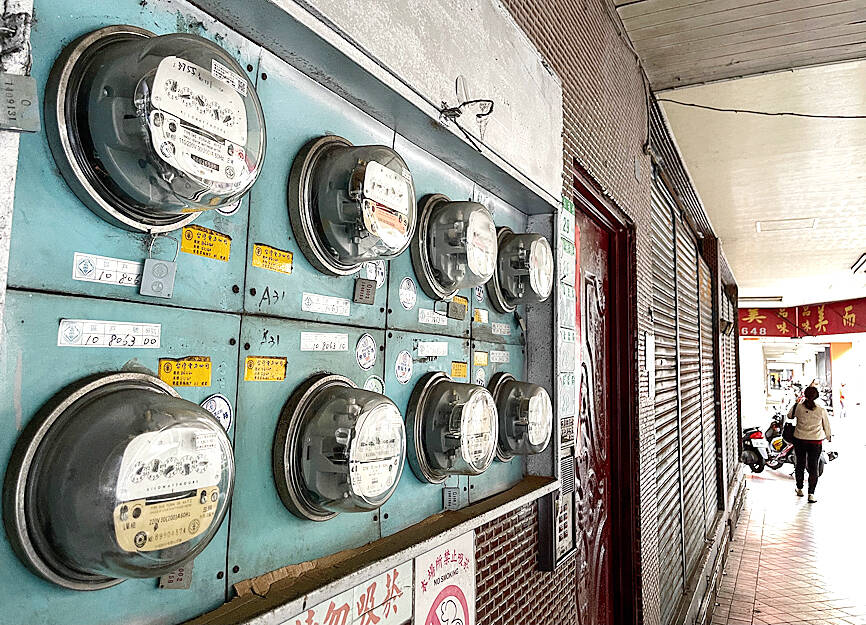The nation’s electricity rates are to remain at an average of NT$3.1154 per kilowatt-hour (kWh) for the next six months due to a drop in international fuel prices and the government’s policy of stabilizing consumer prices, the Ministry of Economic Affairs (MOEA) said in a statement yesterday.
A continued capital injection from the government to state-run Taiwan Power Co (Taipower, 台電) to help support its finances is another reason for the power price freeze, the ministry said.
The decision came after a meeting of the ministry’s electricity price review committee, which determined that electricity rates should be frozen after prices were raised 8.4 percent on average in July last year and 11 percent on average in April.

Photo: CNA
In particular, industrial consumers, namely high-voltage and ultra-high-voltage electricity users, faced rate hikes of 15 percent in July last year and 17 percent in April.
Due to a policy that took effect in July last year, the review committee would continue supporting the domestic agriculture and fishery sectors, schools, social welfare groups and wet market vendors by not increasing their electricity rates for the next six months, the ministry said.
However, the committee ended a freeze on rates for about 880 businesses, including department stores, cinemas, gyms, restaurants and catering service providers, as their power usage and revenues in the first half of the year were higher than the same period last year, the ministry said.
In other words, those businesses would face a 15 percent increase in electricity rates starting next month, it said.
Meanwhile, the committee in April only raised rates half as much (8.5 percent) for low-voltage electricity users, such as the textile, glass, metal, bicycle and optoelectronic sectors, and yesterday maintained those rates for the next six months due to the weak business climate those businesses face, the ministry said.
Overall, the committee’s decision to freeze or cap electricity rates would benefit 120,000 businesses, it said.
Taipower, which reported losses of NT$123 billion (US$3.84 billion at the current exchange rate) in the first half of the year, has said it expects an aggregated loss of about NT$400 billion by the end of this year.
The company received NT$150 billion in capital and an electricity subsidy of NT$50 billion from the government this year, with an additional capital injection of NT$100 billion planned for next year, which would help strengthen its financial health, the ministry said.
The next meeting to determine electricity rates is to take place in April next year.

The US dollar was trading at NT$29.7 at 10am today on the Taipei Foreign Exchange, as the New Taiwan dollar gained NT$1.364 from the previous close last week. The NT dollar continued to rise today, after surging 3.07 percent on Friday. After opening at NT$30.91, the NT dollar gained more than NT$1 in just 15 minutes, briefly passing the NT$30 mark. Before the US Department of the Treasury's semi-annual currency report came out, expectations that the NT dollar would keep rising were already building. The NT dollar on Friday closed at NT$31.064, up by NT$0.953 — a 3.07 percent single-day gain. Today,

‘SHORT TERM’: The local currency would likely remain strong in the near term, driven by anticipated US trade pressure, capital inflows and expectations of a US Fed rate cut The US dollar is expected to fall below NT$30 in the near term, as traders anticipate increased pressure from Washington for Taiwan to allow the New Taiwan dollar to appreciate, Cathay United Bank (國泰世華銀行) chief economist Lin Chi-chao (林啟超) said. Following a sharp drop in the greenback against the NT dollar on Friday, Lin told the Central News Agency that the local currency is likely to remain strong in the short term, driven in part by market psychology surrounding anticipated US policy pressure. On Friday, the US dollar fell NT$0.953, or 3.07 percent, closing at NT$31.064 — its lowest level since Jan.

Hong Kong authorities ramped up sales of the local dollar as the greenback’s slide threatened the foreign-exchange peg. The Hong Kong Monetary Authority (HKMA) sold a record HK$60.5 billion (US$7.8 billion) of the city’s currency, according to an alert sent on its Bloomberg page yesterday in Asia, after it tested the upper end of its trading band. That added to the HK$56.1 billion of sales versus the greenback since Friday. The rapid intervention signals efforts from the city’s authorities to limit the local currency’s moves within its HK$7.75 to HK$7.85 per US dollar trading band. Heavy sales of the local dollar by

The Financial Supervisory Commission (FSC) yesterday met with some of the nation’s largest insurance companies as a skyrocketing New Taiwan dollar piles pressure on their hundreds of billions of dollars in US bond investments. The commission has asked some life insurance firms, among the biggest Asian holders of US debt, to discuss how the rapidly strengthening NT dollar has impacted their operations, people familiar with the matter said. The meeting took place as the NT dollar jumped as much as 5 percent yesterday, its biggest intraday gain in more than three decades. The local currency surged as exporters rushed to